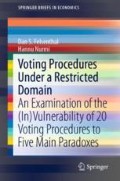Abstract
Voting paradoxes occur in particular profile domains. For the avoidance of the paradoxes it is therefore important to know if the profiles typically encountered in practice are of such nature that the paradoxes are very unlikely or downright impossible. Ever since the publication of Arrow’s theorem, the role of domain restrictions has been appreciated. However, the earlier studies have mainly focused on conditions for rational collective choices through pairwise majority comparisons. In those studies the single-peaked preferences have been found to be an important type of preference similarity that guarantees complete and transitive collective outcomes. This booklet introduces and analyzes a similar preference restriction, viz., the existence in the profile of a Condorcet winner that is elected by the procedure under study. We examine the possibilities of various voting procedures to end up with voting paradoxes under these restricted domains. Thereby we refine the results that establish the vulnerability of some procedures to various kinds of voting paradoxes.
Access this chapter
Tax calculation will be finalised at checkout
Purchases are for personal use only
Notes
- 1.
The Condorcet winner is a candidate that would defeat all the others if pairwise majority comparisons were conducted and the voters voted according to their preferences.
- 2.
The No-Show paradox occurs when a group of voters with identical preferences would be better off abstaining than voting according to its preferences, ceteris paribus.
References
Arrow, K. J. (1963). Social choice and individual values (2nd ed.). New York: Wiley.
Black, D. (1948). On the rationale of group decision making. Journal of Political Economy, 56, 23–34.
Black, D. (1958). The theory of committees and elections. Cambridge: Cambridge University Press.
Colomer, J. (2013). Ramon Llull: From ‘ars electionis’ to social choice theory. Social Choice and Welfare, 40, 317–328.
Felsenthal, D. S., & Nurmi, H. (2017). Monotonicity failures afflicting procedures for electing a single candidate. Cham, Switzerland: Springer.
Felsenthal, D. S., & Nurmi, H. (2018). Voting procedures for electing a single candidate: Proving their (in)vulnerability to various voting paradoxes. Cham, Switzerland: Springer.
Gehrlein, W. V., & Lepelley, D. (2017). Elections, voting rules and paradoxical outcomes. Cham, Switzerland: Springer.
Hägele, G., & Pukelsheim, F. (2008). The electoral systems of Nicholas of Cusa in the Catholic Concordance and beyond. In G. Christianson, T. M. Izbicki, & C. M. Bellitto (Eds.), The church, the councils & reform—The legacy of the fifteenth century (pp. 229–249). Washington, DC: Catholic University of America Press.
Kelly, J. (1978). Arrow impossibility theorems. New York: Academic Press.
Kramer, G. H. (1973). On a class of equilibrium conditions for majority rule. Econometrica, 41, 285–297.
McLean, I., & Urken, A. B. (Eds.). (1995). Classics in social choice. Ann Arbor, MI: The University of Michigan Press.
Riker, W. H. (1961). Voting and the summation of preferences: An interpretive bibliographical review of selected developments in the last decade. American Political Science Review, 55, 900–911.
Sen, A. K., & Pattanaik, P. (1969). Necessary and sufficient conditions for rational choice under majority decision. Journal of Economic Theory, 1, 178–202.
Szpiro, G. (2010). Numbers rule. The vexing mathematics of democracy from Plato to the present. Princeton: Princeton University Press.
Tangian, A. (2014). Mathematical theory of democracy. Heidelberg: Springer.
Author information
Authors and Affiliations
Corresponding author
Rights and permissions
Copyright information
© 2019 The Author(s), under exclusive license to Springer Nature Switzerland AG
About this chapter
Cite this chapter
Felsentha, D.S., Nurmi, H. (2019). Introduction. In: Voting Procedures Under a Restricted Domain. SpringerBriefs in Economics. Springer, Cham. https://doi.org/10.1007/978-3-030-12627-8_1
Download citation
DOI: https://doi.org/10.1007/978-3-030-12627-8_1
Published:
Publisher Name: Springer, Cham
Print ISBN: 978-3-030-12626-1
Online ISBN: 978-3-030-12627-8
eBook Packages: Economics and FinanceEconomics and Finance (R0)

